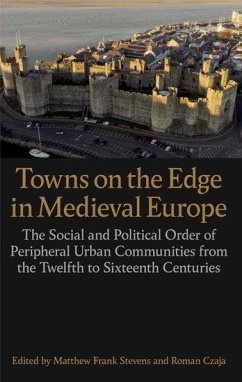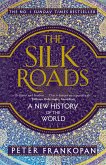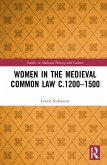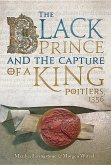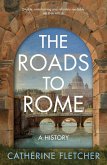Towns on the Edge in Medieval Europe
The Social and Political Order of Peripheral Urban Communities from the Twelfth to Sixteenth Centuries
Herausgeber: Stevens, Matthew Frank; Czaja, Roman
Towns on the Edge in Medieval Europe
The Social and Political Order of Peripheral Urban Communities from the Twelfth to Sixteenth Centuries
Herausgeber: Stevens, Matthew Frank; Czaja, Roman
- Gebundenes Buch
- Merkliste
- Auf die Merkliste
- Bewerten Bewerten
- Teilen
- Produkt teilen
- Produkterinnerung
- Produkterinnerung
Towns on the Edge in Medieval Europe offers comparative research on the emergence and development of medieval chartered towns within northern European territories subjected to conquest and colonisation, namely Ireland, Wales, Prussia, and Livonia.
Andere Kunden interessierten sich auch für
![The Silk Roads The Silk Roads]() Peter FrankopanThe Silk Roads16,99 €
Peter FrankopanThe Silk Roads16,99 €![Women in the Medieval Common Law C.1200-1500 Women in the Medieval Common Law C.1200-1500]() Gwen SeabourneWomen in the Medieval Common Law C.1200-1500163,99 €
Gwen SeabourneWomen in the Medieval Common Law C.1200-1500163,99 €![The Reformation and the Towns in England The Reformation and the Towns in England]() Robert TittlerThe Reformation and the Towns in England115,99 €
Robert TittlerThe Reformation and the Towns in England115,99 €![At Nature's Edge At Nature's Edge]() At Nature's Edge35,99 €
At Nature's Edge35,99 €![The Black Prince and the Capture of a King The Black Prince and the Capture of a King]() Marilyn LivingstoneThe Black Prince and the Capture of a King28,99 €
Marilyn LivingstoneThe Black Prince and the Capture of a King28,99 €![The Roads To Rome The Roads To Rome]() Catherine FletcherThe Roads To Rome14,99 €
Catherine FletcherThe Roads To Rome14,99 €![Resistance at the Edge of Empires Resistance at the Edge of Empires]() Cameron A PetrieResistance at the Edge of Empires100,99 €
Cameron A PetrieResistance at the Edge of Empires100,99 €-
-
-
Towns on the Edge in Medieval Europe offers comparative research on the emergence and development of medieval chartered towns within northern European territories subjected to conquest and colonisation, namely Ireland, Wales, Prussia, and Livonia.
Hinweis: Dieser Artikel kann nur an eine deutsche Lieferadresse ausgeliefert werden.
Hinweis: Dieser Artikel kann nur an eine deutsche Lieferadresse ausgeliefert werden.
Produktdetails
- Produktdetails
- Verlag: Hurst & Co.
- Seitenzahl: 288
- Erscheinungstermin: 10. Juni 2022
- Englisch
- Abmessung: 241mm x 163mm x 23mm
- Gewicht: 585g
- ISBN-13: 9780197267301
- ISBN-10: 0197267300
- Artikelnr.: 64053398
- Herstellerkennzeichnung
- Libri GmbH
- Europaallee 1
- 36244 Bad Hersfeld
- gpsr@libri.de
- Verlag: Hurst & Co.
- Seitenzahl: 288
- Erscheinungstermin: 10. Juni 2022
- Englisch
- Abmessung: 241mm x 163mm x 23mm
- Gewicht: 585g
- ISBN-13: 9780197267301
- ISBN-10: 0197267300
- Artikelnr.: 64053398
- Herstellerkennzeichnung
- Libri GmbH
- Europaallee 1
- 36244 Bad Hersfeld
- gpsr@libri.de
Matthew Frank Stevens studied at Pennsylvania State University and the University of Wales, Aberystwyth, completing his PhD in medieval social and economic history in 2005. He is now an Associate Professor of history at Swansea University. He has been an Ulam fellow of the Polish National Agency for Academic Exchange, at Nicolaus Copernicus University, Toru?, an Eileen Power fellow of the Economic History Society, at Oxford University, and a research officer at the Institute of Historical Research, University of London. He is the author of numerous academic articles and two monographs: Urban Assimilation in Post-Conquest Wales: Ethnicity, Gender and Economy in Ruthin, 1282-1348 (2010) and The Economy of Wales, 1067-1536 (2019). Roman Czaja studied history at the Institute of History and Archives Sciences of Nicolaus Copernicus University, Toru?, completing his PhD. in the Department of Arts in 1991. He is now a Professor of history at NCU, holding the Chair of Medieval History and Auxiliary Sciences of History. A fellow of the Alexander von Humboldt Foundation at Humboldt Universität and Freie Universität in Berlin, in 2018 he was honoured by the University of Debrecen with the degree of Doctor Honoris Causa. He is author of over 250 research articles and of five books. In 2008 he published Grupy rz?dz?ce w miastach nadba?tyckich w ?redniowieczu (Ruling Groups in the Cities of the Baltic Zone in the Middle Ages) with Nicolaus Copernicus University Press.
* 1: Introduction
* 2: The place of native populations in the chartered towns of
conquered regions: Wales and Prussia as a comparative case study
* 3: 'Irishtowns' and 'Welsh Streets': ethnic enclaves within the towns
of colonial Ireland and Wales in a northern-European colonial context
* 4: Women in the small-town economy of medieval Wales and Prussia
* 5: Urban legislation as an instrument for the formation and
regulation of socio-economic life in 14th-century Prussian and Irish
towns
* 6: The participation of craftsmen in municipal governance in late
medieval Malbork and Stockholm
* 7: Shaping the public space of Danzig and Dublin
* 8: Military affairs and community in Prussian, Livonian and Irish
towns, 13th-16th centuries
* 9: Quarters and Quartermasters in Franconian and Prussian Towns,
14th-16th Centuries: The Common People and Their Participation in
Urban Governance
* 10: Maintaining a 'special relationship'? Petitions to the crown from
Irish and Welsh towns, 13th -16th centuries
* 11: Conclusion
* 2: The place of native populations in the chartered towns of
conquered regions: Wales and Prussia as a comparative case study
* 3: 'Irishtowns' and 'Welsh Streets': ethnic enclaves within the towns
of colonial Ireland and Wales in a northern-European colonial context
* 4: Women in the small-town economy of medieval Wales and Prussia
* 5: Urban legislation as an instrument for the formation and
regulation of socio-economic life in 14th-century Prussian and Irish
towns
* 6: The participation of craftsmen in municipal governance in late
medieval Malbork and Stockholm
* 7: Shaping the public space of Danzig and Dublin
* 8: Military affairs and community in Prussian, Livonian and Irish
towns, 13th-16th centuries
* 9: Quarters and Quartermasters in Franconian and Prussian Towns,
14th-16th Centuries: The Common People and Their Participation in
Urban Governance
* 10: Maintaining a 'special relationship'? Petitions to the crown from
Irish and Welsh towns, 13th -16th centuries
* 11: Conclusion
* 1: Introduction
* 2: The place of native populations in the chartered towns of
conquered regions: Wales and Prussia as a comparative case study
* 3: 'Irishtowns' and 'Welsh Streets': ethnic enclaves within the towns
of colonial Ireland and Wales in a northern-European colonial context
* 4: Women in the small-town economy of medieval Wales and Prussia
* 5: Urban legislation as an instrument for the formation and
regulation of socio-economic life in 14th-century Prussian and Irish
towns
* 6: The participation of craftsmen in municipal governance in late
medieval Malbork and Stockholm
* 7: Shaping the public space of Danzig and Dublin
* 8: Military affairs and community in Prussian, Livonian and Irish
towns, 13th-16th centuries
* 9: Quarters and Quartermasters in Franconian and Prussian Towns,
14th-16th Centuries: The Common People and Their Participation in
Urban Governance
* 10: Maintaining a 'special relationship'? Petitions to the crown from
Irish and Welsh towns, 13th -16th centuries
* 11: Conclusion
* 2: The place of native populations in the chartered towns of
conquered regions: Wales and Prussia as a comparative case study
* 3: 'Irishtowns' and 'Welsh Streets': ethnic enclaves within the towns
of colonial Ireland and Wales in a northern-European colonial context
* 4: Women in the small-town economy of medieval Wales and Prussia
* 5: Urban legislation as an instrument for the formation and
regulation of socio-economic life in 14th-century Prussian and Irish
towns
* 6: The participation of craftsmen in municipal governance in late
medieval Malbork and Stockholm
* 7: Shaping the public space of Danzig and Dublin
* 8: Military affairs and community in Prussian, Livonian and Irish
towns, 13th-16th centuries
* 9: Quarters and Quartermasters in Franconian and Prussian Towns,
14th-16th Centuries: The Common People and Their Participation in
Urban Governance
* 10: Maintaining a 'special relationship'? Petitions to the crown from
Irish and Welsh towns, 13th -16th centuries
* 11: Conclusion

